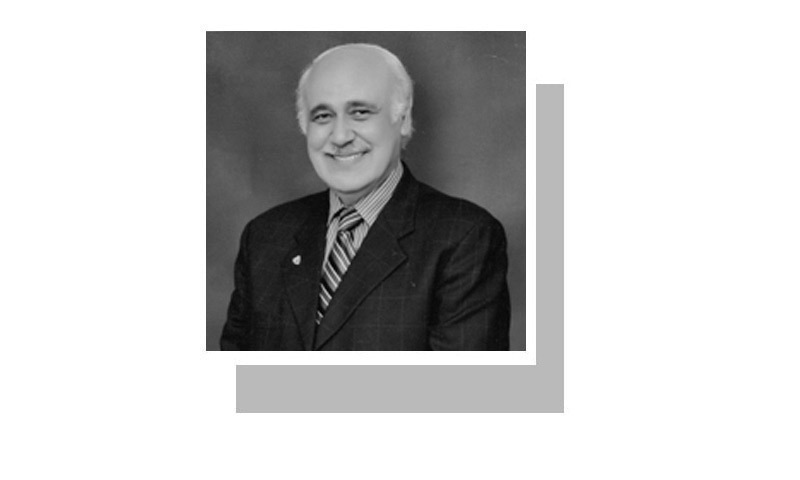GOVERNANCE in Pakistan, like the Arctic icecap, is melting. Its fragments are collapsing into an ocean of incompetence.
Socio-geologists detect signs of an irreversible change in our political climate. Many naysayers argue otherwise. The evidence though is hard to contradict.
One: a former chief justice of Gilgit-Baltistan, signs a legal affidavit in London swearing that he overheard the former chief justice of the Supreme Court of Pakistan give instructions for the continued incarceration of ousted prime minister Nawaz Sharif and his daughter. Mr Z.A. Bhutto was hanged on flimsier hearsay evidence.
Two: our prime minister deliberately forgoes the opportunity at COP26 to hobnob with world leaders, especially the US president whose tele-call he has eagerly sought since January. He loses a chance to tell the world (beyond his captive audiences in Islamabad) of the billion trees planted across his country, over which he reigns but no longer rules.
Their memoirs are the Bayeux tapestry of our diplomacy.
Three: the orders of a commander-in-chief are deemed subject to negotiation, after which his subordinate is shown making ‘farewell calls’ (like some outgoing ambassador) on the prime minister and the president before assuming charge of his new assignment.
Would it constitute treason to suggest that this has created a level of deep, simmering discomfort amongst a citizenry that pays for the unconditional apolitical defence of its realm?
Reductio ad absurdum, does this mean that, in the event of a cross-border attack by an enemy, the order to arms by any service chief would be subject to negotiation before retaliation? The mind boggles, the nation trembles as authority crumbles.
In this disintegration of societal norms and safeguards, one floating ice floe is a reminder of the compact mass our nation once was.
That single berg is a memoir Diplomatic Footprints by Mr Aizaz A. Chaudhry, former foreign secretary and later ambassador to the US. The book is more than his autobiography; it is a biography of Pakistan’s diplomacy.
His predecessors have left their own imprints: Chaudhry Zafrulla Khan, S.M. Burke, Iqbal A. Akhund, Sultan M. Khan, Jamsheed Marker, Abdul Sattar, Sartaj Aziz, and Khurshid Kasuri.
Together, their memoirs are the historical narrative, the Bayeux tapestry of our diplomacy. Mr Chaudhry’s book is uncompromising in its candour. He discusses the impact of 9/11, the Kargil misadventure, the assault on the Taj Mahal Hotel in Mumbai etc. with a frankness that is unusual for a diplomat. Ambassador Aizaz Chaudhry tells the truth; he leaves lying to shame-free politicians.
The extent and depth of Pakistan’s imprint abroad is the truest measure of the performance of Pakistan’s foreign service. Until our diplomacy became a personal perquisite of unprofessional politicians, it was a success, not because we say so but because our enemies say so.
The Indian Ministry of External Affairs still cites our role as the intermediary between the United States and the People’s Republic of China in 1971, teaching it as a case study in the MEA.
The head of ISI was once asked, if he were head of RAW (the Indian intelligence counterpart), what would he fear most from the ISI. His reply was revealing: “The very fact that the Indians fear us is a measure of our success.”
In 2013, Mr Chaudhry began a three-year tenure as foreign secretary and after that, would have remained ambassador in Washington for as long, had he not been peremptorily replaced by a PML-N court favourite. As foreign secretary, he midwifed the CPEC, the relocation of the Foreign Office from the cramped ex-Hotel Shahrazad to a new block, (incidentally, the FO’s cradle was Mohatta Palace in Karachi), and other significant initiatives.
He watched the emergent Crown Prince Mohammed bin Salman slip instructions to his puppet father King Salman, just as Shehbaz Sharif did to his prime minister elder brother.
He witnessed PM Modi’s flying visit to Raiwind in December 2015, where Modi repeated the reassurance his mentor A.B. Vajpayee had extended six years earlier to Nawaz Sharif: “Hum jang na honay denge; khoon ka rang na honay denge”(we will never allow war; never let blood discolour our lives). Modi’s version was equally conciliatory: “Jang ko zang lagya hei. Ab jang nahin hogi” (war has rusted; there will never be another war).
During the final years of his career, Mr Chaudhry fought his own battle with courage against cancer. Since retirement, he has been the director general, Institute of Strategic Studies in Islamabad, an under-utilised research resource for the Foreign Office.
If Pakistanis wish to understand why we succeed abroad when we fail so lamentably at home, let them read Mr Aizaz Chaudhry’s Diplomatic Footprints. It is an unbiased account of one of our better civil services by one of its ablest, perceptive and still optimistic practitioners.
The writer is an author.
Published in Dawn, November 25th, 2021











































